Real Life Theology Podcast
Following Jesus in a Politically Divided World
Episodes
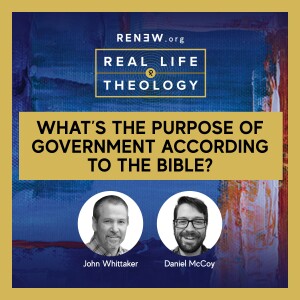
Tuesday Oct 01, 2024
Tuesday Oct 01, 2024
Biblical Perspectives on Government: Purpose and the Christian Response
Get the Premium Podcast Subscription: https://reallifetheologypodcast.supercast.com/
Today’s episode will help us understand the biblical perspective on government, exploring its divine purpose, the roles of church and state, and how Christians should engage with and respond to governance.
Join John and Daniel as they dive into the Bible's teachings on the purpose of government. They discuss how scripture outlines the role of government in restraining evil and promoting good, the importance of Christians submitting to governing authorities, and the balance between obedience to God and the state. The conversation also explores historical perspectives on the church-state relationship and offers insights for Christians navigating today's political landscape.
Get the Book on Following Jesus in a Politically Divided World: https://a.co/d/35XLxSE
Key Takeaways
00:00 Introduction and Greetings
00:11 Biblical Purpose of Government
02:04 Christian Submission to Authority
02:54 Ideal Government vs. Reality
04:40 Human Nature and Government
06:25 Key Biblical Texts on Government
16:24 Historical Church-State Relations
25:25 Temptations in Church-State Dynamics
27:20 Conclusion and Final Thoughts
Check out RENEW.org for more articles and resources: https://renew.org/
View more information about this topic here: https://renew.org/product/following-jesus-in-a-politically-divided-world-an-interactive-guide-to-21-questions-on-christianity-and-politics/
See below for a more comprehensive discussion of this topic:
In this episode, Daniel McCoy and John Whittaker explore the biblical perspective on government. They discuss how scripture guides our understanding of governance, touching on the roles of church and state and the purpose of government.
Daniel and John start with a chat about whether the Bible addresses the purpose of government. John argues that while the Bible doesn’t lay out a full political philosophy, it does suggest that government’s role is to restrain evil and promote good. This idea serves as a foundation for their discussion.
They dive into a hypothetical about governments that overstep their bounds, suggesting that a biblical view would oppose both anarchism and totalitarianism. John agrees, noting that the New Testament expects Christians to respect and honor governing authorities.
John explains that ideally, human government would reflect God’s kingship. Since the world is flawed, we need human authorities to curb evil and promote well-being. This theme of human depravity and the need for governance is central to their discussion.
They highlight key biblical texts like Romans 13 and 1 Peter 2. Romans 13 emphasizes that all authority is from God and that resisting authority is opposing God’s ordinance. Rulers are seen as God’s servants who should promote good and punish evil. 1 Peter 2 also instructs believers to submit to human institutions, reinforcing that authorities are meant to deter evil and reward good.
The conversation then shifts to how these teachings impact political leaders and citizens. John and Daniel argue that leaders should craft policies that foster human flourishing and limit wrongdoing. Citizens should evaluate candidates based on biblical values. John advocates for smaller government, warning against expanding power and its burdens, echoing warnings from ancient Israel.
They discuss four historical models of church and state relations: medieval synthesis, complete opposition, reformed transformation, and evangelistic conversion. They illustrate these models and their implications.
John warns against trying to recreate past church-state dynamics in America. He cautions against the idea of “taking back America for God” through politics, urging Christians to focus on living out their values and transforming culture through the gospel instead.
Finally, they address when Christians might disobey the government. John frames this within a biblical context, arguing that disobedience is justified only when obeying the government means disobeying God. Historical examples like Daniel and the apostles support this view, reinforcing that loyalty to God comes first.
Throughout, they stress the importance of praying for leaders and governance that supports the church’s mission. They reference 1 Timothy 2, encouraging prayers for peaceful and godly living to further the church’s work.
In summary, this episode provides a biblical framework for understanding government, emphasizing the divine origin of authority, the role of government in restraining evil and promoting good, and how Christians should respond to governance.
Interested in more content from RENEW? Sign up for our newsletter: https://renew.org/resources/newsletter-sign-up/
Follow us!

Tuesday Sep 24, 2024
Tuesday Sep 24, 2024
Scripture in Black and White: https://scriptureinblackandwhite.podbean.com/
Step Into Scripture: https://stepintoscripture.podbean.com/
Today’s episode will help us understand how to navigate complex political and ethical issues by grounding our decisions in biblical principles, focusing on the character of Christ, God’s commands, and the consideration of consequences.
In this episode, John and Daniel go into a framework for Christians to navigate political, cultural, and ethical issues. They emphasize the importance of basing decisions on the character and commands of God, rather than purely consequentialist thinking. Key topics include the sanctity of life, the abortion debate, and the process of aligning political stances with a biblical worldview. Through their discussion, they offer Christians practical tools and insights for making morally grounded decisions in a politically divided world.
Get the Book on Following Jesus in a Politically Divided World: https://a.co/d/35XLxSE
Key Takeaways
00:00 Introduction and Greetings
00:32 Discussing Right and Wrong
02:27 Philosophical Approaches to Ethics
05:07 Consequentialism and Its Pitfalls
07:22 Christian Perspective on Ethics
11:23 Teaching Ethics to Children
13:03 Sanctity of Life and Abortion Debate
25:45 Summarizing the Ethical Framework
Get the Premium Podcast Subscription: https://reallifetheologypodcast.supercast.com/
Check out RENEW.org for more articles and resources: https://renew.org/
View more information about this topic here: https://renew.org/product/following-jesus-in-a-politically-divided-world-an-interactive-guide-to-21-questions-on-christianity-and-politics/
See below for a more comprehensive discussion of this topic:
In this episode John Whittaker and Daniel McCoy discuss how Christians should approach political, cultural, and ethical issues through a biblical lens. They aim to help Christians ground their decisions in biblical principles, focusing on character, commands, and consequences.
The episode begins with a friendly exchange between John and Daniel, who reflect on their ongoing discussions about politics and faith, highlighted in their book on following Jesus in a divided world. Their goal is to understand how to honor Jesus over nationalistic values.
John introduces the main topic: developing a framework for addressing complex political and ethical issues. He stresses the importance of understanding the guiding principles behind decisions of right and wrong. Daniel notes that many people rely on gut feelings, which can align with biblical moral sense, but acknowledges that humans often struggle to consistently follow moral laws.
They discuss consequentialism, an ethical theory where the moral worth of an action is judged by its outcomes. Daniel explains various ethical theories—virtue ethics, Kantian deontological ethics, and consequentialism. He points out that many people are consequentialists, making decisions based on perceived benefits. However, he warns that while consequences matter, they should be grounded in fundamental principles like God’s character and commands.
John and Daniel explore how these ethical theories impact political decisions, noting that debates often revolve around consequentialist arguments. While the Bible acknowledges the importance of consequences, it emphasizes that moral decisions should be rooted in God’s commands and character. Daniel uses utilitarianism to illustrate the dangers of basing moral decisions solely on outcomes.
The discussion shifts to how Christians should navigate ethical issues by prioritizing Christ’s character and God’s commands. Daniel outlines a three-part approach: starting with the character of Christ, following God’s commandments, and considering the consequences. He emphasizes that Christians should base their ethical decisions on Jesus’ virtues and biblical values, avoiding arbitrary or outcome-based reasoning.
John adds that reflecting God’s character and obeying His commands align with our nature as beings made in God’s image, fulfilling our purpose. He notes that holiness and human nature complement each other.
They then apply this framework to the issue of abortion and the sanctity of human life. They start by examining God’s character, emphasizing His value of human life and children. They contrast this with the dehumanizing actions associated with evil, such as murder and lying.
The conversation highlights the biblical commandment "do not murder" as a clear directive against taking innocent life. Daniel addresses debates around personhood and fetal status, arguing that the Bible’s emphasis on the sanctity of human life should shape the Christian stance on abortion. He warns against redefining life to justify abortion.
Daniel critiques ethicist Michael Tooley’s argument, which separates human life from personhood to reduce stigma around abortion and infanticide. He points out the dangers of arbitrary criteria for personhood, which can lead to broader justifications for dehumanization.
John references Peter Kreeft’s book "The Unaborted Socrates," which argues against abortion by affirming the personhood of preborn babies. While Daniel agrees, he cautions against relying solely on personhood arguments and stresses the need to focus on biblical teachings about the sanctity of human life.
The episode wraps up with practical advice for applying the framework to ethical issues. Daniel suggests that Christians form ethical statements based on God’s character and commands while considering consequences. For example, statements might affirm the value of human life, obedience to the command not to murder, and support for pro-life laws, while showing compassion for those affected by abortion.
John underscores the importance of clear ethical statements for guiding Christians in their decisions, emphasizing that this framework, as detailed in their book, helps Christians navigate political and cultural issues biblically.
Interested in more content from RENEW? Sign up for our newsletter: https://renew.org/resources/newsletter-sign-up/
Follow us!
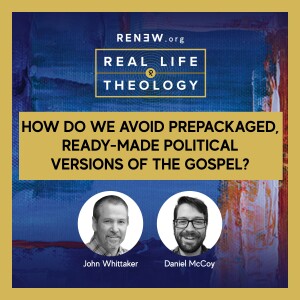
Tuesday Sep 17, 2024
Tuesday Sep 17, 2024
Get the Book on Following Jesus in a Politically Divided World: https://a.co/d/35XLxSE
Today’s episode will help us navigate the complex relationship between faith and politics, ensuring our Christian beliefs remain rooted in the gospel rather than being swayed by polarized political agendas.
Get the Premium Podcast Subscription: https://reallifetheologypodcast.supercast.com/
Join Daniel and John as they discuss the challenges Christians face in navigating political fragmentation in modern society. Highlighting concepts from their book, they explore 'Punch Right, Coddle Left,' the influence of 'Red Cap' and 'Blue Cap' gospels, and the need for a convictional faith centered on Jesus rather than political affiliations. They emphasize the importance of discipleship, unity, and engaging the culture with a Kingdom of God mindset.
Key Takeaways 00:00 Introduction and Greetings00:06 Discussing the Book's Purpose00:55 Punch Right and Coddle Left05:18 Generational Shifts in Political Views07:54 Navigating Political Allegiances as Christians17:17 The Red Cap Gospel19:48 The Blue Cap Gospel28:46 Dangers of Pre-Packaged Gospels32:28 Conclusion and Final Thoughts
Check out RENEW.org for more articles and resources: https://renew.org/
View more information about this topic here: https://renew.org/product/following-jesus-in-a-politically-divided-world-an-interactive-guide-to-21-questions-on-christianity-and-politics/
See below for a more comprehensive discussion of this topic:
This episode features an interview on how Christians can navigate the intersection of faith and politics in a polarized world. Daniel and John discuss the importance of avoiding politicized versions of the gospel and offer guidance for thoughtful discipleship in a divided landscape.John introduces the phrase "punch right, coddle left," describing how it’s easier in broader culture to critique conservative views while being gentler on left-leaning ideas. This leads to a discussion about how some beliefs are safer to support because they align with marginalized groups. Church leaders often avoid discussing certain conservative values to prevent alienating newcomers.
Daniel asks if this trend varies by generation, and they reminiscing about a time when evangelicals moved away from political conservatism during their college years. They speculate that future generations might swing back to traditional values. The discussion then turns to "third wayism," a middle-ground stance that avoids full alignment with any political party. The guest challenges this approach, arguing that Christianity isn’t about finding a middle ground but about holding firmly to biblical convictions, even when they don’t align with political parties.
Next, they discuss the risks of adopting "red cap" and "blue cap" gospels, symbolizing blind loyalty to Republican and Democratic platforms. The "red cap" gospel is critiqued for equating faithfulness with the Republican agenda, while neglecting Jesus' teachings. The guest, who admits to a conservative bias, clarifies that the Christian worldview shouldn’t be confused with the Republican platform.
The "blue cap" gospel, viewed through the lens of intersectional feminism and critical theory, is described as an ideology that seeks to dismantle power structures and elevate marginalized voices, often conflicting with traditional Christian teachings. The guest explains how these ideologies influence progressive politics, leading to reinterpretations of scripture to avoid perceived harm.
Daniel raises concerns about the practical effects of these ideological shifts, noting the cultural chaos they seem to create. The guest agrees, suggesting that intersectional frameworks often create conflict between historical and marginalized groups, altering societal values.
The episode wraps up with a reflection on the dangers of these prepackaged gospels. Both hosts emphasize that these oversimplify and distort the gospel, leading to a loss of true Christian teachings and community division. They express concern that evangelicalism’s association with the "red cap" gospel alienates potential churchgoers who view the church as politically biased. This division also fractures the church itself along political lines.Finally, the hosts call for a return to a gospel-centered approach, stressing that the kingdom of God operates independently of political affiliations. By focusing on love, joy, and peace in the Holy Spirit, Christians can navigate political participation without compromising their faith. They highlight the need for discipleship and personal discernment in political engagement to maintain unity and true Christian witness.
Interested in more content from RENEW? Sign up for our newsletter: https://renew.org/resources/newsletter-sign-up/
Follow us!
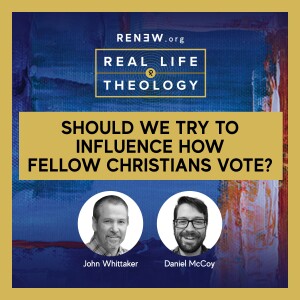
Tuesday Sep 10, 2024
Tuesday Sep 10, 2024
Click here to review the framework on What is Essential? What is Important? What is Personal?
https://renew.org/renew-theology-what-is-essential-what-is-important-what-is-personal/
Today’s episode will help us thoughtfully engage with political issues as Christians, balancing our convictions with respect for differing views and prioritizing unity within the church.
In this video, John and Daniel tackle the important question of whether Christians should care about political matters. They explore the real-world implications of political decisions on communities and the responsibility of Christians to engage with cultural and political issues rather than retreating. Through a critical lens, they discuss the balance between political engagement and maintaining the central focus on the teachings of Jesus. They also touch on the role of personal convictions in voting, using the framework of essential, important, and personal elements to discern what is worth discussing and debating within the Christian faith.
Get the Book on Following Jesus in a Politically Divided World: https://a.co/d/35XLxSE
Key Takeaways 00:00 Introduction and Initial Greetings06:08 Discipleship and Political Influence08:33 Biblical Worldview and Political Preferences14:50 Essential, Important, and Personal Convictions22:23 Navigating Political and Cultural Divides29:56 Conclusion and Final Thoughts
Check out RENEW.org for more articles and resources: https://renew.org/
View more information about this topic here: https://renew.org/product/following-jesus-in-a-politically-divided-world-an-interactive-guide-to-21-questions-on-christianity-and-politics/
See below for a more comprehensive discussion of this topic: In the episode titled "Politics Interview 6: Should we try to influence how fellow Christians vote?" the hosts engage in a discussion about the relationship between Christian values and political engagement. They explore whether Christians should involve themselves in politics and if it's appropriate to influence the voting behavior of fellow believers.The conversation begins with some friendly banter between John and Daniel, setting a relaxed tone. Daniel questions whether Christians should care about politics, and John responds emphatically, arguing that political decisions have significant real-world consequences that Christians cannot afford to ignore.
They then discuss the Paris Olympics controversy, where a drag queen portrayed the Last Supper, sparking outrage. Whoopi Goldberg’s suggestion to simply “turn the TV off” if offended prompts a debate about political disengagement. Both agree that while stepping back occasionally can be good for mental health, complete disengagement is irresponsible for Christians. They advocate for a balanced approach where Christians engage with culture, uphold biblical values, and maintain healthy boundaries.
John shares a personal story about his brother, who decided to limit his consumption of political news to improve his mental health and better love those around him, even if they had differing political opinions. This highlights the need for balance between political involvement and personal well-being.
The discussion then shifts to whether discipling relationships should involve guidance on how to vote. John shares his experience, emphasizing that he prefers to guide people through critical thinking and values rather than telling them how to vote. Daniel agrees, stressing that Christianity should inform political convictions without being tied to partisan politics. They both highlight the importance of focusing on core values over specific policies.
John and Daniel introduce the Renew.org framework, which categorizes issues into "Essential," "Important," and "Personal." This framework helps Christians differentiate between core biblical principles and their contemporary applications, encouraging respectful and thoughtful political discussions within the church.
As a concrete example, John discusses the division among Christians over mask mandates during the COVID-19 pandemic, lamenting how differences of opinion led some to leave their churches. He underscores the importance of practicing the principles of Romans 14, which call for accepting one another despite differing convictions.
The episode concludes with a call for Christians to approach political issues with respect and grace, prioritizing unity in the church over political alignment. The hosts emphasize that while political decisions should be prayerful and aligned with biblical values, Christians must also maintain love and respect for those with differing views. Ultimately, the episode encourages Christians to engage thoughtfully and respectfully with political issues, always rooted in biblical truth.
Interested in more content from RENEW? Sign up for our newsletter: https://renew.org/resources/newsletter-sign-up/
Follow us!
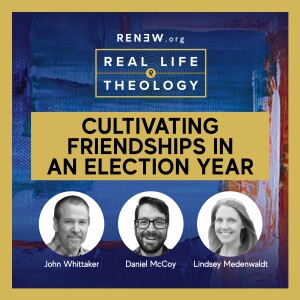
Tuesday Aug 27, 2024
Tuesday Aug 27, 2024
Bridge Building Apologetics: Navigating Faith and Politics with Lindsey Medenwaldt
Check out the book Bridge Building Apologetics:
https://www.amazon.com/s?k=bridge+building+apologetics&gad_source=1&hvadid=694569270943&hvdev=c&hvexpln=67&hvlocphy=9198482&hvnetw=g&hvocijid=6379582220225934721--&hvqmt=e&hvrand=6379582220225934721&hvtargid=kwd-2237213819898&hydadcr=19710_13380304&tag=googhydr-20&ref=pd_sl_5g8ib4mr3j_e_p67
Join us for an insightful discussion with Lindsey Medenwaldt, author of 'Bridge Building Apologetics' and director of operations at Mama Bear Apologetics, as she explains the importance of maintaining friendships despite deep disagreements, whether on religion or politics. Lindsey shares personal anecdotes, practical advice, and the significance of listening and understanding in fostering healthy dialogues. Learn how to have productive conversations, stand firm in your beliefs, and still keep your friends.
Get the Book on Following Jesus in a Politically Divided World: https://a.co/d/35XLxSE
Key Takeaways 00:00 Introduction to Lindsey Medenwaldt and Her Work00:26 The Concept of Bridge Building Apologetics01:39 Personal Stories of Disagreement and Friendship03:54 Challenges in Modern Dialogue06:32 Understanding Different Political Perspectives08:31 The Importance of Genuine Conversations10:57 The Role of Empathy and Respect16:05 Spiritual and Emotional Preparedness21:37 The Power of Listening and Friendship24:37 Concluding Thoughts on Bridge Building
Check out RENEW.org for more articles and resources: https://renew.org/
View more information about this topic here: https://renew.org/product/following-jesus-in-a-politically-divided-world-an-interactive-guide-to-21-questions-on-christianity-and-politics/
See below for a more comprehensive discussion of this topic:
This episode features an in-depth interview with Lindsey Medenwaldt, author of "Bridge Building Apologetics," Director of Operations at Mama Bear Apologetics, and writing instructor at Northwestern College. The discussion centers on "bridge building apologetics," a method designed to foster meaningful dialogue and connections despite differing beliefs, particularly in religion and politics.
Daniel McCoy opens the interview by introducing Lindsey and her impressive background. He asks Lindsey to explain the concept of "bridge building apologetics" and its significance in today's divisive climate. Lindsey describes it as speaking truth with love and maintaining friendships despite disagreements on significant issues like religion and politics, encouraging a culture of respectful dialogue.John Whittaker joins the conversation, asking Lindsey to share a personal story illustrating her approach. Lindsey recounts her interactions with atheists, both online and in person, emphasizing mutual respect. She notes that respectful discourse is often lacking within Christian communities and stresses the importance of embodying Christ-like characteristics in disagreements.
The discussion shifts to political polarization. Using hypothetical characters, McCoy explores the fears, hopes, and narratives of Republicans and Democrats. Lindsey highlights the dangers of assuming homogeneity within political groups and stresses the importance of personal conversations to understand individual beliefs and experiences.
Lindsey and John discuss the importance of listening well, referencing Francis Schaeffer's idea of spending most of a conversation listening rather than speaking. They agree that many conflicts could be diffused by prioritizing understanding over winning an argument.
The conversation turns to practical applications of bridge-building apologetics. Lindsey advises against taking hostility personally, recognizing that others' anger may stem from past hurt or misunderstandings. She encourages Christians to stand firm in their faith while respecting others' perspectives and maintaining a heart of peace.
The episode ends with a shared emphasis on prioritizing the gospel in all interactions. Lindsey and John agree on embodying Christian values in political discussions and everyday life, fostering a culture of understanding and respect.
In summary, this episode delves into "bridge building apologetics," highlighting listening, respect, and genuine care as essential to overcoming divisions in today's polarized political and religious landscape. Lindsey Medenwalt and her co-hosts offer valuable insights and practical advice for maintaining meaningful connections amidst disagreements, always pointing back to the gospel.
Interested in more content from RENEW? Sign up for our newsletter: https://renew.org/resources/newsletter-sign-up/
Follow us!
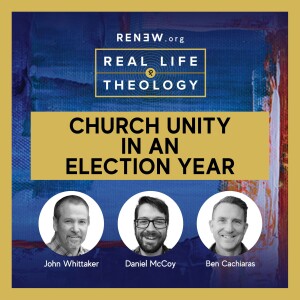
Tuesday Aug 20, 2024
Tuesday Aug 20, 2024
Navigating Election Season as a Christian Leader
Have you experienced Disunity in your Church?
What do you think are some practical steps church leaders can take to foster unity within their congregations during politically divisive times?
Join Daniel as he interviews Ben Cachiaras from Mountain Christian Church in the Baltimore area on how lead ministers can navigate the chaos of election seasons. Ben emphasizes three main principles: the importance of unity within the church, maintaining Jesus' lordship above political affiliations, and leveraging the cultural moment to focus on gospel mission. He provides practical advice and anecdotes on fostering unity and handling social media as a pastor, urging leaders to keep the gospel at the center despite the political climate.
Get the Book on Following Jesus in a Politically Divided World: https://a.co/d/35XLxSE
Key Takeaways 00:00 Introduction and Guest Introduction02:48 The Importance of Unity in the Church07:18 Practical Steps to Foster Unity26:20 The Role of Social Media in Christian Discourse31:05 Deciding When to Address Cultural Issues35:06 Concluding Thoughts and Encouragement
Check out RENEW.org for more articles and resources: https://renew.org/
View more information about this topic here: https://renew.org/product/following-jesus-in-a-politically-divided-world-an-interactive-guide-to-21-questions-on-christianity-and-politics/
See below for a more comprehensive discussion of this topic:
This episode features an in-depth conversation between Daniel from Renew-Org and Ben Cachiaras, a respected church leader from Mountain Christian Church in Baltimore. The discussion focuses on how church leaders can navigate the complexities and divisiveness of an election season, particularly when political issues infiltrate religious communities.
The episode opens with Daniel asking Ben to share three main principles that church leaders should follow during chaotic election seasons. Ben emphasizes the importance of unity within the church, noting that the polarization seen in society has seeped into religious communities. He stresses that maintaining unity is essential for the church's witness to the gospel and recounts Jesus' plea for unity in John 17. Ben also references the Apostle Paul's teachings in Ephesians 4, urging leaders to work diligently to keep their communities united in a spirit of peace.
Daniel and Ben agree that leaders should not remain silent on contentious issues, as their congregations are heavily influenced by media outlets like Fox News and CNN. Ben underscores the necessity for church leaders to address political and social issues thoughtfully, without being partisan, to avoid damaging the church's gospel message.
The conversation then turns to the role of social media in amplifying divisive behaviors. Both hosts discuss how Christians often behave aggressively online in ways they wouldn't in face-to-face interactions. Ben suggests that church leaders should directly address proper social media usage in their teachings, reminding congregants that their online behavior should reflect Christian values. He proposes using passages like Colossians 3, which urges believers to rid themselves of anger and slander, to guide social media conduct.
Throughout the episode, Ben touches on the broader theme of maintaining focus on the gospel during election seasons. He warns against the dangers of mixing politics with Christianity, as it can alienate those the church aims to reach. Ben points out that while political engagement is important, the church's primary mission is to make disciples and spread the gospel.
To illustrate his points, Ben uses biblical passages such as Romans 14, emphasizing that disagreements over non-essential issues, like policies or political stances, should not lead to division. He stresses the need for church leaders to elevate their congregations' perspectives, urging them to remember their ultimate citizenship in heaven and the importance of their witness on earth.
As the episode concludes, Ben addresses how to decide which cultural issues to address from the pulpit. He believes that when an issue is prominent in everyone's minds and has significant implications for the church, it should be discussed. Ben also highlights the need for preachers to remind their congregations of the overarching vision of God’s sovereignty, no matter who holds political power, referencing Isaiah 6.
The episode wraps up with a call to prayer for wisdom, as church leaders face the challenge of guiding their communities through politically turbulent times. Ben's insights provide a thoughtful framework for balancing political engagement with maintaining the core mission of the church, offering practical advice and biblical grounding for church leaders navigating election seasons.
Interested in more content from RENEW? Sign up for our newsletter: https://renew.org/resources/newsletter-sign-up/
Follow us!
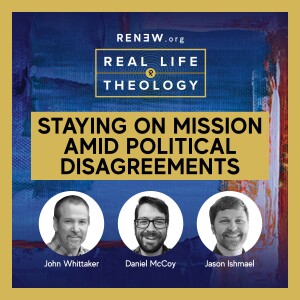
Tuesday Aug 13, 2024
Tuesday Aug 13, 2024
Balancing Faith and Politics: Leading with Christ-Centric Integrity
“Today’s episode will help us focus on ways to keep Christ at the center amidst political pressure.”
Join Jason Ishmael, lead pastor of Antioch Christian Church, as he discusses his first Iowa caucus season, navigating faith and politics. Alongside editorial director Daniel McCoy and John Whitaker, co-author of 'Following Jesus in a Politically Divided World,' they go into keeping Christ at the center amidst political pressures. Jason emphasizes discipleship, maintaining integrity, and avoiding the pitfalls of political endorsements, while sharing insights on church-state dynamics and the necessity of a mission-focused approach.
Get the Book on Following Jesus in a Politically Divided World: https://a.co/d/35XLxSE
Watch the Video: https://youtu.be/Flrt7vpidUA
00:00 Introduction and Guest Introductions
00:20 Navigating the Iowa Caucus as a Church Leader
01:30 Balancing Faith and Political Engagement
03:18 Challenges of Political Endorsements in Church
07:36 Maintaining Mission Focus Amidst Political Pressure
18:59 Historical Perspectives on Church and State
24:12 Addressing LGBTQ Issues in the Church
30:58 Conclusion and Final Thoughts
Check out RENEW.org for more articles and resources: https://renew.org/
View more information about this topic here: https://renew.org/product/following-jesus-in-a-politically-divided-world-an-interactive-guide-to-21-questions-on-christianity-and-politics/
Today's episode features a discussion among three speakers—Daniel McCoy, John Whitaker, and Jason Ishmael—who explore the complexities and challenges of navigating church leadership, political involvement, and maintaining the integrity of their mission as Christian leaders. Daniel McCoy introduces Jason Ishmael, the lead pastor of Antioch Christian Church in Iowa, and himself as the editorial director for Renew.org, with insights also contributed by John Whitaker. The conversation begins with Jason Ishmael sharing his experiences during the Iowa caucus season, where political candidates often seek to speak at churches, highlighting the pressures and potential consequences of such engagements. Jason emphasizes the importance of keeping the church’s primary mission—building relationships with God and discipling others—at the forefront, warning against the risks of political endorsements that could alienate members of the congregation.
The discussion continues with a focus on how political activities can sometimes conflict with the mission of making disciples. Jason stresses the value of personal conversations and discipleship over political posturing. The speakers then touch on the historical context of church and state dynamics, noting the dangers when the church has too much political power, which can lead to corruption. Jason shares insights from a sermon series titled "Freedom and Fences," which addressed LGBTQ issues, emphasizing the need to handle such topics with grace and ensure that church doctrine aligns with scripture. The video concludes with John Whitaker reflecting on the church's overarching goal of forming individuals in Christ, reinforcing the importance of a disciple-centered mission, and the necessity of balancing grace and truth in all matters, particularly in politically charged environments. The discussion underscores the need for church leaders to navigate these challenges with a focus on discipleship, mission integrity, and a commitment to approaching every issue with grace and truth.
Visit Renew.org to sign up for our email newsletter and be the first to know about new content, books and resources.
Be sure to like, subscribe and follow on social media!
You can find us on:Instagram: @the.renew.network Facebook: Renew.org Youtube: https://www.youtube.com/@RENEWnetworkTwitter: @therenewnetwork
Interested in more content from RENEW? Sign up for our newsletter: https://renew.org/resources/newsletter-sign-up/
Follow us!
TikTok: the.renew.network Rumble: https://rumble.com/c/RENEW
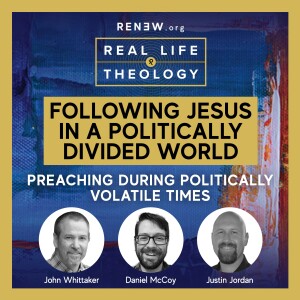
Tuesday Aug 06, 2024
Tuesday Aug 06, 2024
Navigating Faith and Politics: A Conversation with Justin Jordan
“Today’s episode will help us navigate faith and politics with critical thinking, grace, and a focus on biblical principles in a politically divided world.”
We are kicking off a brand new series talking about how to Follow Jesus in a Politically Divided world. John Whitaker, along with Daniel McCoy and Justin Jordan, pastor at Real Life Ministries Treasure Valley in Meridian, Idaho, discusses Justin's recent sermon series on following Jesus in a politically divided world. The conversation dives into the importance of critical thinking, understanding scripture, and engaging in relationships beyond political divides. Justin emphasizes the need to prioritize God's kingdom and how navigating discussions around justice, mercy, and community engagement can help believers grow in Christ-likeness and influence society positively.
Get the Book on Following Jesus in a Politically Divided World: https://a.co/d/35XLxSE
Key Takeaways
00:00 Introduction and Guest Introduction
00:14 The Sermon Series: Following Jesus in a Politically Divided World
01:12 Engaging as Disciples, Not Just Voters
03:19 Challenges and Receptivity in the Congregation
04:48 The Role of the Kingdom of God in Politics
08:36 Navigating Difficult Conversations with Grace
20:45 Practical Examples of Justice and Mercy
31:50 Final Thoughts and Advice for Church Leaders
Check out RENEW.org for more articles and resources: https://renew.org/
View more information about this topic here: https://renew.org/product/following-jesus-in-a-politically-divided-world-an-interactive-guide-to-21-questions-on-christianity-and-politics/
See below for a longer description:
This episode begins with John Whitaker introducing the panel and setting the stage for the conversation. Justin Jordan, a pastor at Real Life Ministries Treasure Valley in Meridian, Idaho, shares his experiences and insights from his recent sermon series about following Jesus in a politically charged environment. He explains that the series aimed not to dictate how to vote but to encourage believers to engage thoughtfully and biblically in the political realm. The conversation then shifts to why it's significant to teach Christians to think critically about scripture and God's kingdom rather than simply adopting the views of their preferred political analysts.
Daniel McCoy engages Justin in a thought-provoking discussion about the importance of not swaying to either political side purely out of comfort or refuge. Justin stresses the critical role of scripture in guiding believers to think deeply and engage with both sides of the political spectrum, highlighting that following Jesus' teachings often means embracing ideas that challenge the status quo of both major political factions.
Throughout the interview, John and Daniel prompt Justin to reflect on the reactions of his congregation to his sermon series. Justin reveals that while some congregants were resistant at first, there was a significant group eager to learn how to handle political conversations with grace and biblical insight. This willingness to engage stems from their experiences with political division and the desire to navigate these conversations without fracturing relationships.
As the episode progresses, the conversation steers towards the practical outworking of justice and mercy in political engagement. Justin outlines that these concepts are fundamental to God's character and should consequently be integral to a Christian's life. He references scripture to back up the importance of caring for the oppressed, the hungry, and other marginalized groups, urging believers to actively embody these values in their communities.
The dialogue shifts to the role of Christians in politics and community service. Justin asserts that while voting is important, it's not enough. Christians are called to engage deeply and relationally within their communities, exemplifying God's justice and mercy. He shares practical examples from his church's initiatives, like their involvement with Meridian Food Bank and Stanton Healthcare, as well as their ongoing support for a local Title 1 school, Meridian Elementary.
The episode culminates with a discussion on the importance of nuanced, courageous leadership in church communities, especially in politically charged times. Justin advises church leaders to navigate these complex conversations with wisdom, starting with internal discussions among church leadership before addressing the broader congregation.
This episode is a compelling exploration of how Christians can faithfully engage in politics without compromising their spiritual integrity. Join us for this thought-provoking conversation that promises to inspire and challenge your perspectives on faith and politics.
Interested in more content from RENEW? Sign up for our newsletter: https://renew.org/resources/newsletter-sign-up/
Follow us!